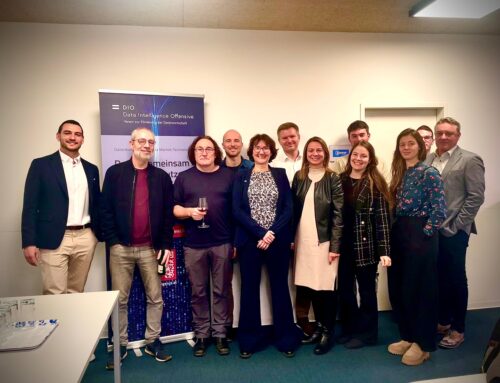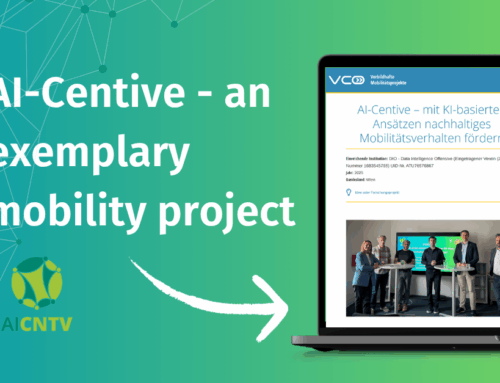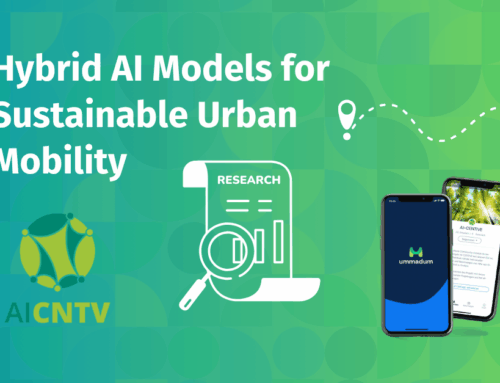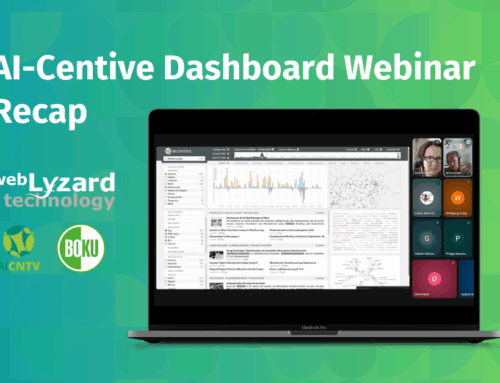On June 26, 2023, the AI-CENTIVE Public Kick-off was held at the IBM Vienna Office, where the project partners and experts from the AI and mobility industry gathered together to present the current developments of the project, its goals, and the next steps ahead.
The event began with a warm welcome from Josef Kroebmannsberger, who provided a brief overview of IBM’s history and its connection to artificial intelligence. Lyndon J.B. Nixon and Lisa Kolar introduced the AI-CENTIVE and provided insights into the purpose and goals of the project.
First panel discussion: Project partners introduced the current stage of AI-CENTIVE and its core goals
Astrid Gühnemann from BOKU presented a summary of mobility behavior in Austria. The challenges of changing mobility habits and beliefs were discussed, along with the limited acceptance of strict policies. Soft measures and incentives were suggested as effective strategies. Incentives such as real-time information, feedback, social networks, and tangible rewards were proposed to encourage sustainable mobility. The use of apps and electronic devices was found to be limited but increasing in unfamiliar situations, highlighting the need for accurate information and suitable incentives.
Arno Scharl, Managing Partner at webLyzard technology, showcased the webLyzard platform, where visual analytics combines data science and visualization to provide insights. The webLyzard dashboard focuses on Web intelligence and incorporates the latest online trends into decision-making workflows. The “Lite” version analyzes public debates and tracks articles in real-time. The “Professional” version offers advanced customization, forecasting, and identifies opinion leaders for message amplification, with impact metrics and emotion detection algorithms. The platform will be used for the AI-CENTIVE project.
Lyndon J.B. Nixon, Assistant Professor for Applied Data Science at MODUL University explained how AI, specifically deep learning and forecasting, can help predict and influence future mobility choices. These AI models have shown higher accuracy compared to traditional methods. By considering various features such as trip details, static and dynamic events, climate, and spatial factors, we can a better understanding of people’s mobility choices. The goal is not only to predict future trips, but also to incentivize sustainable decisions based on this knowledge.
Egon Prünster, CTO of ummadum presented the ummadum platform, which aims to promote sustainable travel behavior. Users who travel sustainably through the platform are rewarded with coupons from event organizers or have the opportunity to participate in exciting competitions. They receive regular rewards and can look forward to discounted visits in the future. The goals of AI-CENTIVE with the ummadum platform include gathering valuable on-trip and pre-trip information to identify more sustainable route alternatives. The platform also aims to discover incentives that lead to changes in mobility choices and optimize sustainable behavior.
When discussing the future of AI in the mobility sector in Austria, Arno acknowledged the anticipated significant changes and emphasized the importance of decreasing reliance on the US. Lyndon emphasized the project’s global assistance objective. Egon highlighted the influential role of politics, citing France as a leader in providing incentives. Astrid drew attention to the limited digitalization in rural areas and emphasized the necessity of enhancing planning tools through AI integration.
Second panel discussion: Sustainable mobility transition with the help of new technologies – external perspective
During the panel discussion, Christina Hubin from Upstream Mobility introduced the concept of upstream mobility, emphasizing the role of data in reducing car dependency. Data was highlighted as a valuable tool for forecasting mobility patterns, evaluating sustainable initiatives, and informing decision-making processes. The control aspect of data was exemplified through the use of a scooter dashboard.
Britta Fuchs put forward the examples of sustainable mobility initiatives in the VOR-Region, representing public transport in Lower Austria, Vienna, and Burgenland. The introduction of e-buses in Lower Austria required data for efficient planning, considering factors like energy consumption and range. In areas unsuitable for large buses, VOR implemented pilot projects to modernize their Demand-Responsive Transportation (DRT) system. Notably, the LISA project in Tulln introduced flexible transportation options through an app or phone booking system, catering to the specific needs of those areas.
The discussion highlighted the challenges of data accuracy and accessibility addressed by both Upstream Mobility and VOR. They expressed their commitment to improving data sharing. Recognizing the distinct requirements of rural and urban areas, VOR emphasized their exploration of mobility on demand to provide independent transportation alternatives for rural residents, aiming to reduce reliance on private cars. App-based bookings were noted as the primary method for accessing this service. The panel emphasized the significance of obtaining a comprehensive data overview to facilitate effective decision-making.
Here you can find the presentations of the individual speakers:
Sustainable behavior and benefits, Egon Prünster, CTO, ummadum
Mobility for the People, Christina Hubin, Head of Strategy & Communication, Upstream Mobility
Examples of Sustainable Mobility in the VOR-Region, Britta Fuchs, Planner VOR

First Panel Discussion: (left to right) Dr. Professor Arno Scharl, Dr. Professor Astrid Gühnemann, Aramazt Khabayan
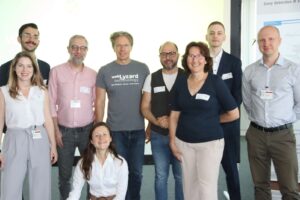
AI-CENTIVE Project Team
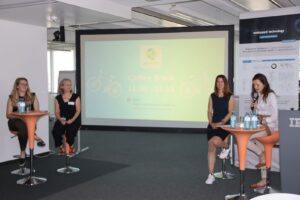
Second Panel Discussion: (left to right) Michael Taudes, Britta Fuchs, Christina Hubin, Katarzyna Wróbel

